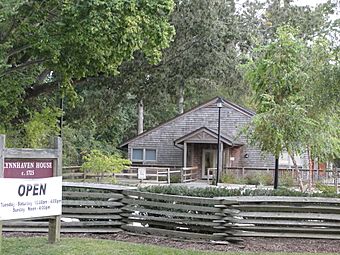Lynnhaven House facts for kids
|
Lynnhaven House
|
|
 |
|
| Location | 4409 Wishart Rd., Virginia Beach, Virginia |
|---|---|
| Area | 110 acres (45 ha) |
| Built | c. 1725 |
| NRHP reference No. | 69000363 100011638 (decrease) |
Quick facts for kids Significant dates |
|
| Added to NRHP | November 12, 1969 |
| Boundary decrease | April 3, 2025 |
The Lynnhaven House, also called the Wishart–Boush House, is a very old home in Virginia Beach, Virginia. It was built around the year 1725. This house shows us how homes were built in the Tidewater Virginia area during the 1700s. It is sometimes called the Boush House or the Wishart House. The house got its main name, Lynnhaven House, because it is very close to the Lynnhaven River. The river flows right on the same property.
When it was first built, the home was part of a large 250-acre farm. Today, it sits on about five and a half acres.
Life at Lynnhaven House
The Lynnhaven House tells us about the life of Francis Thelaball. He was a plantation owner who built the house for his family. This home gives us a look into the life of a middle-class farmer, not a super-rich one.
Francis, his wife Abigail, and their five sons lived in the house. An apprentice and several enslaved people also lived there from 1725 to 1727. We don't know much about Francis and Abigail. But we know more about Francis's cousin, Joyce Langley Thelaball, who was born in 1694.
House Design and Details
The house has special design features that show it was built with care. These include brick arches above the windows. Inside, there is a staircase with unique teardrop shapes. The floors were built using a method called "ship's lap." These details show that the builder cared about both quality and art.
Behind the old house, there is a small cemetery. Some of the graves there date back to the American Revolutionary War. This burial ground is from the 1800s. It belongs to the Boush family, who once owned the house. This is why the house is sometimes called the Boush House.
Preserving History
The Lynnhaven House was a private home until 1971. Then, the family who owned it, the heirs of William W. Oliver III, gave it to Preservation Virginia. This group used to be called the Association for the Preservation of Virginia Antiquities.
Preservation Virginia took care of the house for a while. Later, the City of Virginia Beach bought the property. This 18th-century home has changed very little over the years. It is believed that about 85% of its original building materials are still there. This makes it one of the best-preserved buildings from that time period in the country.
The Lynnhaven House was added to the National Register of Historic Places in 1969. This means it is recognized as an important historical site.
See also



